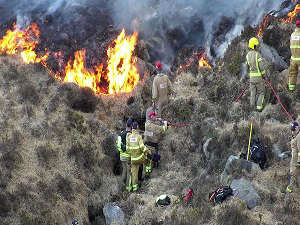
By Rebecca Black, PA
A health trust leader has pleaded with governments for the funds needed to deliver services.
Neil Guckian, chief executive of Western Health Trust, said Stormont and Westminster must recognise trusts are coming out of a pandemic and facing “massive backlogs”.
Dr Cathy Jack, chief executive of Belfast Health Trust, said the system had needed reform before the pandemic, adding that hospitals and community services remain under “significant strain”.
“The main and exasperating factor is the really tired workforce with additional Covid sickness absence and the long-term vacancies that we carry,” she said.
Continuing outbreaks in care homes curtail the ability to discharge from hospital, she added, while high levels of Covid mean that community services cannot cope with demand and emergency departments are “relentlessly busy”.
She said social distancing and personal protective equipment have “slowed up work” and created additional barriers in caring for those in need.
“The demand for intensive care has reduced…and there are signs of staff returning to work as community transmission lessens, but I wish I could be more hopeful that our recovery will be quick, that is simply not the case,” she said.
“There has been far-reaching damage done, some of which we have not yet even assessed, and this is in the context of a pandemic which is not yet over.”
The leaders of the five trusts in Northern Ireland told the Stormont Health Committee of the pressure on resources.
All reported high staff absence rates.
– In the Belfast trust, Dr Jack said there were over 13% off, 5% due to Covid and a general rate of 8.3%.
– In the Northern trust the total absence was given as 13.1% – 3.7% for Covid, 2.5% self-isolating and 6.9% for other reasons.
– In the Southern trust the absence rate was put at 9-10%.
– In the South Eastern trust the absence rate was given as 13% – 5.4% from Covid and 7.6% non-Covid.
– In the Western trust the absence rate has come down to 10% from 14% in the last pandemic surge, but Mr Guckian said pockets of teams are experiencing “significant levels of absences which really impacts on services”.
A three-year Stormont Budget is out for consultation, but it is expected to be impacted by the resignation of Paul Givan as first minister, which also forced deputy first minister Michelle O’Neill from the joint office.
Mr Guckian said a multi-year Budget is fundamental to the health service.
“We really need to get out of the cycle whereby at the end of every year everything gets rebased and the reliance on non-recurrent monies,” he said.
“I think it’s really, really important that we would work to try to keep that.”
However, he warned that any Budget is “only as good as the numbers in the Budget”.
Mr Guckian said the health service has the same inflationary pressures as every other organisation, as well as the demographic pressures of an ageing population.
“If the Budget is neutral in terms of inflation only, it means we can’t offer increases to our existing packages of care, for example, it impacts on our ability to address need – an 85-year-old person consumes 11 times the health and social care resources of a younger person.
“As we have more 85-year-olds in our population, we need more of a Budget to meet the needs or the needs aren’t met.
“I would plead to the Government, I would plead to national Government to recognise we’re coming out of a pandemic, there are massive backlogs in our systems which need resources as well in terms of waiting lists and all our services, so please give us the resources we need to deliver our services.”



 Firefighters tackle wildfire near Glenshane Pass
Firefighters tackle wildfire near Glenshane Pass
 Thousands march to derelict Casement Park to demand its redevelopment
Thousands march to derelict Casement Park to demand its redevelopment
 PPS to consider any basis for appeal against Oliver MacCormack sentence
PPS to consider any basis for appeal against Oliver MacCormack sentence
 Working group to assess impact of trade tariffs on Northern Ireland businesses
Working group to assess impact of trade tariffs on Northern Ireland businesses
 Drugs worth £860,000 seized following search in Kilkeel
Drugs worth £860,000 seized following search in Kilkeel